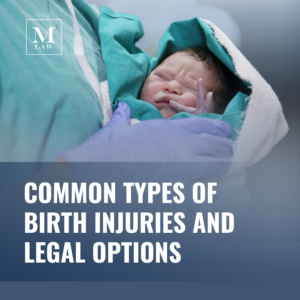What is Hypoxic-Ischemic Encephalopathy (HIE)?
Hypoxic-Ischemic Encephalopathy (HIE) is a severe birth injury that occurs when a newborn’s brain is deprived of oxygen and blood flow during labor and delivery. HIE can lead to long-term neurological disabilities, including cerebral palsy, developmental delays, epilepsy, and cognitive impairments. In the most severe cases, it can result in stillbirth or infant death.
HIE is often preventable when medical professionals provide proper prenatal care, carefully monitor fetal distress during labor, and respond appropriately to complications. Medical negligence in these critical moments can lead to devastating consequences, making it crucial for affected families to understand their legal rights.
Causes of HIE: How Medical Malpractice Plays a Role
While some cases of HIE may result from unavoidable medical complications, many stem from medical negligence before, during, or immediately after birth. Some of the most common preventable causes include:
1. Failure to Monitor Fetal Distress
Doctors and nurses must carefully monitor the baby’s heart rate during labor to detect signs of distress. Abnormal fetal heart rate patterns may indicate oxygen deprivation, requiring an immediate response. Studies show that failure to monitor fetal heart rate is a leading cause of birth injuries.
2. Delayed or Improperly Performed C-Section
An emergency C-section is often required to prevent oxygen deprivation. Failure to order a timely C-section can significantly increase the risk of HIE, leading to permanent brain damage. A botched C-Section is also something you can learn about.
3. Umbilical Cord Complications
Umbilical cord issues—such as cord prolapse, compression, or wrapping around the baby’s neck—can cut off oxygen supply. If medical staff fail to detect and address these complications in time, the baby may suffer from HIE.
4. Placental Abruption or Uterine Rupture
Placental abruption (when the placenta separates from the uterus prematurely) and uterine rupture can cause severe oxygen deprivation. Immediate medical intervention is required to prevent brain damage.
5. Misuse of Birth-Assisting Tools
Improper use of forceps or vacuum extractors during delivery can cause head trauma or restricted blood flow, leading to severe brain injuries.
6. Failure to Perform Therapeutic Hypothermia (Cooling Therapy)
If HIE is suspected, doctors can minimize brain damage by initiating cooling therapy within six hours of birth. Failure to provide this treatment can be considered medical malpractice.
Signs and Symptoms of HIE
The severity of HIE varies, but common symptoms include:
- Immediately After Birth: Low Apgar scores, difficulty breathing, weak muscle tone, or seizures.
- In the First Months of Life: Feeding difficulties, trouble with movement, or developmental delays.
- Long-Term Effects: Cerebral palsy, epilepsy, intellectual disabilities, vision or hearing loss, and motor impairments.
Legal Options for Families Affected by HIE
If your child has been diagnosed with HIE due to medical negligence, you may have grounds for a medical malpractice lawsuit.
How Do You Prove Medical Malpractice?
To succeed in an HIE malpractice case, your legal team must prove:
- Duty of Care: The medical provider had a legal obligation to provide proper care.
- Breach of Duty: The provider failed to follow accepted medical standards.
- Causation: The provider’s negligence directly caused the child’s HIE.
- Damages: The child suffered injuries leading to medical expenses, pain and suffering, and long-term care needs.
What Compensation Can Families Receive?
A successful medical malpractice claim can help families secure compensation for:
- Medical expenses (hospital bills, rehabilitation, therapy, medications, assistive devices)
- Future care costs (special education, home modifications, long-term medical care)
- Pain and suffering
- Lost wages (if a parent must leave work to care for the child)
- Wrongful death damages (if the child tragically does not survive)
Why Choose Merson Law for Your HIE Case?
At Merson Law, we specialize in birth injury malpractice cases, including HIE lawsuits. Our experienced legal team has successfully fought for families dealing with devastating birth injuries, ensuring they receive the justice and financial support they deserve.
When you work with us, we: ✅ Investigate your case thoroughly with top medical experts ✅ Gather strong evidence of negligence ✅ Fight aggressively for maximum compensation ✅ Offer compassionate legal support during a challenging time
What to Do If You Suspect Medical Negligence Caused Your Child’s HIE
If you believe your child’s HIE was caused by medical malpractice, take these steps:
- Get a Second Medical Opinion: Seek confirmation from a specialist.
- Request Medical Records: Obtain all documents related to prenatal care, labor, and delivery.
- Document Symptoms & Expenses: Keep records of your child’s condition and medical costs.
- Contact a Birth Injury Lawyer: An experienced attorney can help you understand your legal rights and determine if you have a strong case.
Contact Merson Law Today
If your child has been diagnosed with Hypoxic-Ischemic Encephalopathy (HIE) and you suspect medical negligence, you have legal options. At Merson Law, we are committed to fighting for families affected by birth injuries and holding negligent medical providers accountable.
📞 Call us today for a free consultation. Let us help you secure the justice and compensation your family deserves.
At Merson Law, we believe that every child deserves a future. If medical negligence robbed your child of a healthy start in life, we are here to fight for you.








